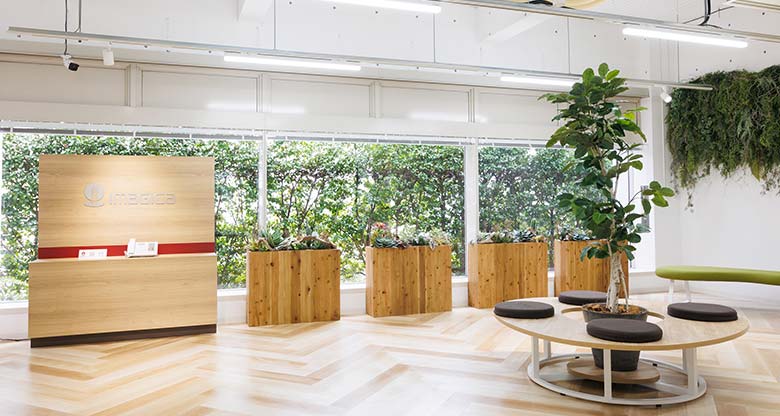

History
- 1932
- Nagase Shoten (Nagase & Co., Ltd.) opened Far East Film Laboratory in Uzumasa,
Kyoto
Began processing and printing business for movie films
- 1935
- Established Kyokuto Genzosho (Far East Laboratories Ltd.) Started film development in Uzumasa, Kyoto
- 1936
- Started its operation at Yokohama factory
- 1938
- Moved the headquarter to Kyoto
- 1942
- Renamed the company to Toyo Genzosyo Corp.
- 1951
- Started its operation at Gotanda, Tokyo factory
- 1953
- Began color processing in the Gotanda factory
- 1954
- The first work, Gate of Hell, won the Academy Award for Best Foreign Language Film
- 1963
- Began photography business (processing, printing, etc.) in earnest. Became a designated
processing lab for Kodachrome Films
Later opened photography processing labs all over Japan
- 1964
- Engaged in the processing of a highly acclaimed documentary film for XVIII Tokyo Olympic
- 1965
- Developed our special composite device for compositing motion pictures
- 1970
- Engaged in the processing of the official documentary film and news footage for the Japan World Exposition (Expo’70) in Osaka
- 1971
- Started video editing and audio mixing services in Gotanda
Opened the Osaka office
- 1972
- Processed the film for the official documentary of the XI Olympic Winter Games in Sapporo, Japan
- 1974
- Established a video post-production center in Higashi-shinagawa
- 1976
- Processed the film for the official documentary of the Expo ‘75 held in Okinawa
- 1982
- Developed Links Ⅰ and TRACY, the proprietary computer graphic hardware and software, and
entered into CGI production business
Developed our own motion control camera system
- 1983
- Developed color processor for 70 mm films for compatibility with large image
- 1984
- Developed optical printer for 70 mm films
- 1985
- Developed a telecine system, Movie-Tone
Work on hi-vision image began in earnest
Engaged in the production of films, videos and photographs for the pavilions at the International Exposition (Tsukuba Expo ’85) in Tsukuba, Japan
- 1986
- Renamed the company as IMAGICA Corp. at the company’s 50th anniversary
Joined production projects such as exhibition and pavilion image
- 1987
- Merged with the Eastman Kodak Company and established Kodak IMAGICA Inc., separating the photography department
- 1993
- Established Imagica USA, Inc. in LA
—Started optical effect services for 70mm screens
Established Akasaka Video Center for TV program
- 1995
- Released an original digital film scanner, Imager3000V
—Used globally in digital effects productions, especially in Hollywood
- 1996
- Launched Cinefil Imagica, a satellite broadcasting channel for movie fans
- 1997
- Established Ginza 7-chome Studio
Started DVD Authoring Services
- 2000
- Co-produced the IMAX film, “The Old Man and the Sea” that won the Best Short Film
(Animated) award at the 72nd Academy Awards
The Kansai office separated as IMAGICA WEST Corp. to strengthen its services in the Kansai area
- 2001
- Developed GaletteTM, a proprietary color management system
—Used in“Spirited Away” by Ghibli Studio
- 2002
- Won the Scientific and Engineering Award at the 74th Academy Awards for the engineering
excellence and the contribution to the motion picture industry for the development of the 65mm/ 35mm
Multi-Format Optical Printer
Established three companies, IMAGICA FORCE Inc., IMAGICA DC21 Inc., and IMAGICA Entertainment Inc., for image planning and production
- 2005
- Started digital intermediate services Established Azabu-juban Studio
- 2006
- Established Imagica Robot Holdings Inc. as a holding company and IMAGICA became a core
company for postproduction and media distribution services in the group
Mastered the first DCI compliant feature film for digital cinema screening
- 2009
- Developed CLAVIS, a proprietary digital cinema release support system
- 2010
- Absorbed Links DigiWorks, Inc. to combine its CGI production with IMAGICA’s VFX and post production
- 2012
- Established Shibuya Studio for TV Program
- 2013
- Established Ogikubo Animation House
- 2015
- Digitized the precious film of a hot spring resort in the Showa era“LUCORE”
- 2016
- Opened Shibuya Parkway Studio (Shibuya Ward, Tokyo) and began editing 8K images
- 2017
- Established Ogikubo Animation House (Suginami Ward, Tokyo) for total coordination of anime production
- 2018
- IMAGICA Corp., IMAGICA WEST Corp., and IMAGICA Imageworks, Inc. merged and changed its name to IMAGICA Lab. Inc.
- 2019
- Established IMAGICA IRIS Inc. as the first venture project in the IMAGICA GROUP
Inc.
Established Park Avenue Studio NEXT (Shibuya-ku, Tokyo) and started MA for 22.2ch
Launches Japan’s first color grading, digital cinema package (DCP) mastering and projection services compatible with “Dolby Cinema™”
- 2020
- Established IMAGICA SDI Studio, Inc. as a dubbing studio in Japan with SDI Media.
- 2021
-
The production services segment of IMAGICA GROUP has been restructured
to create IMAGICA Lab., which specializes in post-production of TV programs, TV commercials and so on.
